Infant Food Refusal: Is it Reflux or EoE (Eosinophilic Esophagitis)? with Antonella Cianferoni, MD, PhD
- How EoE differs from other allergic diseases even though the reflux-like symptoms are common
- Why EoE leads to growth faltering and why boys tend to develop it more than girls
- What to do if you suspect your baby has EoE
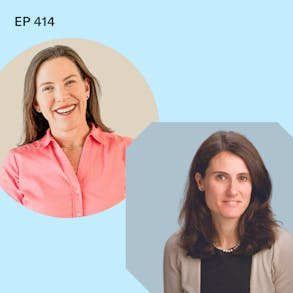
LISTEN TO THIS EPISODE
Episode Description
It’s not uncommon for infants or toddlers to refuse food. Food refusal can be due to illness, tiredness, your baby’s temperament on that day…but, there is a disease that results in food refusal called Eosinophilic esophagitis or EOE.
About the Guest
- Antonella Cianferoni, MD, PhD is a food allergy expert specializing in Eosinophilic Esophagitis (EoE) at the Children’s Hospital of Philadelphia
Links from this Episode
- CHOP’s Center for Eosinophilic Disorders: https://www.chop.edu/centers-programs/center-pediatric-eosinophilic-disorders
- American Partnership for Eosinophilic Disorders (APFED): https://apfed.org/about-ead/egids/eoe/
- Baby-Led Weaning with Katie Ferraro program with the 100 First Foods™ Daily Meal Plan, join here: https://babyledweaning.co/program
- Baby-Led Weaning for Beginners free online workshop with 100 First Foods™ list to all attendees, register here: https://babyledweaning.co/baby-led-weaning-for-beginners
Other Episode Related to this Topic

Latest Episodes
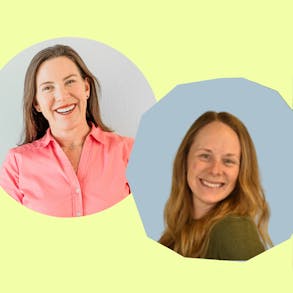
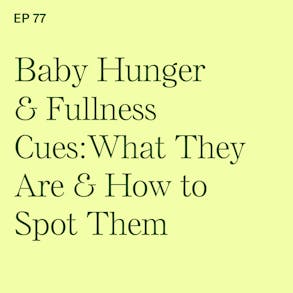
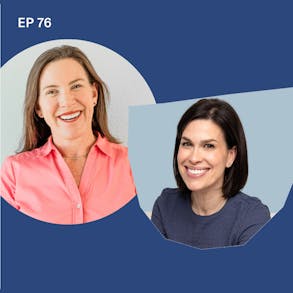
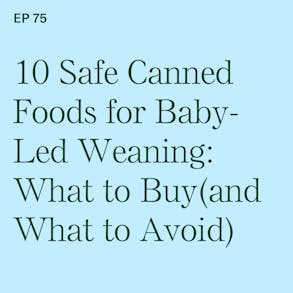
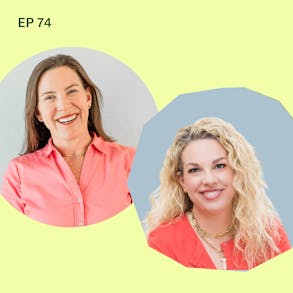
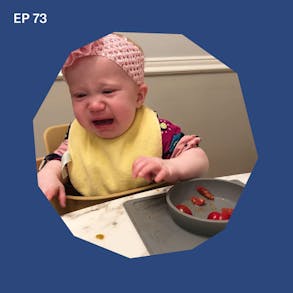
1 (0s):
Are you trying to squeeze the starting solid food stuff into your already busy schedule? Well, I have an all-in-one done for You solution that's going to take the guesswork out of feeding your baby. My online program is called Baby-Led Weaning with Katie Ferraro contains all of my Baby-Led Weaning training videos, the original a 100 First Foods content library, plus a hundred day meal plan with recipes like the exact sequence of which foods to feed in which order. So if you wanna stop trying to piece all this feeding stuff together on your own, I would be honored if you would join me inside of the program. You can get signed up at babyledweaning.co/program.
Puffworks (31s):
Have you tried peanut with your baby yet? So intact nuts and thick gloves of nut butters or choking hazard for babies. so we can't do that, but we do need to get peanut protein into your baby early and often to help lower the risk of peanut allergy down the road. So my favorite way to do peanut for Baby-Led Weaning is using the Puffworks baby peanut puffs. Now these are not those little starchy puffs that earlier eaters can't pick up the ones you see at the grocery store and the container that oftentimes contain added sugar, sodium, and refined grains. No, the Puffworks baby peanut puffs have no added sugar. They're about the size of your adult pinky finger, which is the perfect length for Baby-Led Weaning. So I have students and parents always asking about like different puffs. I saw one today that a mom asked me about it had three different allergens in it, which makes no sense because you can't observe for a reaction if your baby is trying three new allergenic foods at once. How do you know which of the ingredients is causing the reaction? The only potential allergenic ingredient in the Puffworks baby peanut puffs is peanut. You can get 15% off of Puffworks baby peanut puffs if you use my affiliate discount code babylead. So head to puff works.com and enter that code babylead at checkout and good luck to you guys trying peanut.
2 (1m 44s):
So the most common food that EoE is milk and then the second most common food is wheat or egg. And then after that is more rare and usually it's a high protein food like soy or legumes, peanuts could cause it as well.
1 (2m 8s):
Hey there, I'm Katie Ferraro, Registered dietitian, college nutrition professor and mom of seven specializing in Baby-Led Weaning. Here on the Baby-Led Weaning with Katie Ferraro podcast. I help you strip out all of the noise and nonsense about feeding, giving you the confidence and knowledge you need to give your baby a safe start to solid foods using Baby-Led Weaning. It is not uncommon for infants or toddlers to occasionally refuse food and food refusal can be due to any number of factors, right? It could be illness, it could be tiredness, it could be that you open the banana when the kid wanted to do it by themselves and now they won't eat the said banana.
1 (2m 51s):
But there is a disease that results in food refusal and it's called Eosinophilic Esophagitis or EoE, EoE is a chronic allergic inflammatory disease of the esophagus. So that's the tube that connects your, your mouth to your stomach, but also in your baby, their mouth to their stomach. And there's a type of white blood cell called eosinophil that if it accumulates in the esophagus, these eosinophils altogether can cause injury and inflammation to the esophagus. So the damage then makes it difficult and uncomfortable for the baby or the toddler to eat, which in turn results in poor growth, chronic pain and or difficulty swallowing.
1 (3m 32s):
And some of the symptoms of EoE are very similar to that of reflux. And I know a lot of your babies struggle with reflux. So we've covered that here on the podcast and in many cases the EoE can originally get written off as reflux, which it certainly is not. So my guest today is one of the world's leading specialists in Eosinophilic Esophagitis or EoE. Her name is Dr. Antonella Cianferoni. Dr. Cianferoni is a medical doctor. She also has a PhD in pediatric immunology and she's a researcher, a professor, and also an attending physician. So I love to interview the people who are doing the research but who also work with the people who have the condition. And so she is that certainly that unique combination.
1 (4m 13s):
And she's at the Children's Hospital of Philadelphia commonly referred to as chop. And today Dr. Cianferoni is going to explain what EoE is, why it sometimes gets confused with reflux. How EoE is treated as an allergic disease. And, I think you'll be surprised because the treatment and certainly the diagnosis and how you diagnose is quite different than the other allergic diseases that we've covered here on the podcast. I was also surprised to learn that boys are diagnosed with EoE at much higher rate than girls and Dr. Cianferoni is gonna tell us why In this episode. So with no further ado, I want to introduce Dr. Antonella Cianferoni and she's talking about Infant food refusal. Is it reflux or is it EoE?
2 (4m 59s):
Thank you for the invitation. It is a pleasure to be here.
1 (5m 2s):
Can you tell me a little bit about the work you do and just your history? How did you get into this very unique area of work of nutrition and digestion and allergies and everything that you work in?
2 (5m 17s):
I'm an allergist and I trained in Boston Children. My history is a bit unusual because I, as you can tell by my accent, I come from Italy and then while I was doing a fellowship, I met my husband and so we decided to relocate here and after the fellowship I joined the Children's Hospital of Philadelphia where I have been a faculty since 2007. And so when I joined, Dr. Spargo had created a big group for treating Eosinophilic Esophagitis that at that time it was just starting and because in our hospital one of our expertise is food allergy and, it was and, it was evident that then Eosinophilic Esophagitis was another manifestation of food allergy.
2 (6m 16s):
Then we became interested and we do in general food allergy IgE and non IgE-mediated. And so Children's Hospital has probably the one of the largest pediatric population in the country and we do a multidisciplinary clinic with a nutritionist, gastroenterologist and allegist to treat these patients.
1 (6m 39s):
So what would you say are the symptoms of EoE? Well maybe you could tell us what it is. If you could put it in layman's terms, what are the symptoms and then are they different in infancy than they would be in toddler and school aged children?
2 (6m 53s):
So Eosinophilic Esophagitis is an inflammation of the esophagus. So it sounds very different from other allergic disease, but it's basically just an allergy manifestation that happens in the esophagus instead of on the skin or in the lung. So it's a sort of asthma of the esophagus or atopic dermatitis of the esophagus. The difficult thing is that if you leave it untreated, it can cause potentially after many years some more severe symptoms like cause a stricture of the esophagus and maybe not reversible anymore.
2 (7m 34s):
So at the beginning the inflammation is reversible, meaning that if you treat it it goes away and, it doesn't have any long-term consequences like fibrosis which is almost is kind of a scar then of the esophagus. And because the esophagus is very elastic, then if you have a scar it doesn't expand as much when you swallow. And so the food can get stuck. It's not dangerous in terms of it, it's not precursor of cancer, you have time to treat it but when you diagnose it's good to treat. The problem is the diagnosis at this point is just through an endoscopy where you have, especially in young children, you have to do an anesthesia and then it's a quick procedure, very safe, but you have to get a piece of the tissue of the esophagus and that makes a diagnosis a bit more difficult to obtain.
1 (8m 34s):
What are some of the symptoms when you see parents they think, oh maybe I need to go in and have an endoscopy. I mean that's not something that comes to mind. What precursor symptoms with the baby be experiencing or showing?
2 (8m 49s):
So in the babies the EoE is a bit more difficult to think about EoE because a lot of the symptoms in the babies are very common in the general pediatric population. So reflux symptoms like frequent spitting up or vomiting and feeding difficulties, kids that they cannot progress from a liquid to puree, to solid small pieces and then bigger pieces, those are the two most common symptoms. So typically what we say is that if you have reflux that is not impairing the growth, like there is some speed up but the growth, it's fine.
2 (9m 40s):
And, it's getting better as you introduce the solid, you don't have to worry if you have a reflux that respond to mild medication like famotidine, which is an antihistamine that block the acid also that it doesn't have to worry but if you have a reflux that doesn't allow you to gain weight or if you start to have a reflux and then you have feeding difficulties, that is not the typical, you know, babies are not necessarily easy to win from formula or from breast milk to solid.
2 (10m 24s):
But if you there are continuous progresses then you have to be less worried. But if it's a baby that it's well puree and then in bigger food you cannot eat and there is this history of speeding up before, that's when you should see a gastroenterologist.
1 (10m 42s):
Hey we're gonna take a quick break but I'll be right back.
FamilyAlbum (10m 48s):
My phone is bursting at the seams with photos of our kids and over the years I've tried all sorts of different ways to store and share them with family members. So for a while I would just text out pictures to the grandparents and then we tried a shared photo album but some people were using Google photos and others preferred Facebook messenger for pictures and the more kids we had the messier it got. Then I stumbled across the FamilyAlbum app. The FamilyAlbum app was created to give parents a secure and easy way to share photos and videos with loved ones. It's a totally secure personal haven for your family's memories. I love that there's no third party ads, no unwanted eyes and it's totally free, no more scrolling through endless feeds or searching folders to find the picture of the kid that you need right now. Another cool feature about the FamilyAlbum app is you can order eight free photo prints every month to be delivered to your home, which if you think about how quickly your baby is changing, it's really nice to have some tangible pictures to hold onto or share to document the last month of your baby's life. If you are looking to level up your photo sharing and organization game with a secure one stop easy to use photo organization app, head over to the app store, search FamilyAlbum, download the FamilyAlbum app and start creating a legacy of love one photo at a time.
1 (12m 8s):
So if I'm hearing you correctly, if you have typical reflux symptoms but the baby's growth is charting and tracking as you would progress, there's no failure to thrive, they're progressing through textures, that's not a problem. But if you had reflux that was persistent and impairing the baby's ability to transition beyond purees and their growth was faltering, then you would suspect EoE and do the endoscopy. Is that correct?
2 (12m 36s):
No, at least to see a gastroenterologist to start to discuss because it may, you know if the symptoms are managed they may give you some medicine and then try to win the medicine and when the win fail let then it will do an endoscopy. Yeah.
1 (12m 52s):
Is there anything environmental or genetic that would predispose a particular child to EoE?
2 (12m 59s):
So EoE, it's quite familiar, so different from all the allergic disease tend to run in family, but if the risk for example of asthma if there is a siblings with asthma is two times more the risk. If you have a siblings with EoE it's to have another child. With EoE it's 40 times more and so there is like a stronger genetic component of it happens more often in boys than in girls and we have found some genes that they are associated both to be boys and that they run into family and so often there is a family history of EoE, especially in the male grandfather, dad, but can be also in the mother but it's often more in the boys part of the family.
2 (13m 58s):
Yeah.
1 (13m 58s):
You beat me to the next question. I was gonna ask you why the boys tend to get it more, but is EoE something that a child would typically outgrow or is it a lifelong diagnosis?
2 (14m 8s):
You know, most of the patients tend to be lifelong diagnosis. So, the studies that they have been looking at, patients that fall fell off from treatment or they didn't want treatment when they were diagnosed, all these patients tend to present later with the more severe EoE. We reviewed our EoE cases, we review one of our fellow that now is one of our attending, reviewed 3000 charts.
2 (14m 51s):
And, that, and that they were truly, you know, one of the trigger, one of the most common trigger of EoE can be food, especially milk or milk and wheat and, that those patients that they had responded to a milk free diet and they were symptoms free for a long time, then about 30 patients could reintroduce the milk and so they were outgrowing but they're not the most common patient.
1 (15m 19s):
Can you talk a little bit about foods? You mentioned you know, cow's milk protein, like which foods tend to be implicated and then are there foods that are generally considered to be safe foods? I'm thinking like if you think of pies and there's a list of you know, kind of high, medium and low risk foods is, does the same thing exist for EoE? Is it individualized? Is there no food correlation?
2 (15m 38s):
So no, there is like a sort of like pies, so they're both very imp empiric diagnosis meaning that they, we don't have a marker that say like when you are allergic to the peanut therefore and you have anaphylaxis to peanut, you can look for IgE against the food either with skin tests or blood tests. But this is not true for EoE. So patients with EoE tend to make IgE against food and have real food allergy but if you measure the IgE and try to do a diet based on the IgE you're going to fail. So the most common food that cause EoE is milk and about 30 to 50% of patients respond to a one food elimination diet that eliminate only milk.
2 (16m 31s):
And then the second most common food is wheat or egg. So younger kids tend to be more allergic to egg, older kids and adult more to wheat. And then after that is more rare and usually the high protect food like soy or legumes, peanuts could cause it as well.
1 (16m 56s):
What if you had a baby that got a diagnosis of EoE, went to the pediatric gastroenterologist, had the endoscopy, gets the diagnosis, what's the treatment like? Is it medication? Do you have surgery, is it just an elimination diet?
2 (17m 12s):
The treatment can be, there are multiple choices so you're not stuck with only one treatment, that's the the good of EoE you have choices. So medication can work or diet can work. The surgery it's not recommended unless you have a very progressed EoE that cause a lot of fibrosis, and it stricture that it's not possible to resolve because there is no inflammation and there is just fibrosis and so the gastroenterologist can do a dilation of the esophagus and mechanical dilation. But as pediatrician we hope never to get there and use medication or diet to treat the EoE.
2 (17m 58s):
So usually we speak with the family and we give the option of the drug or the diet and we prefer to do only one treatment initially. So as medication that works for you is the proton pump inhibitor like one used at higher dose for babies or kids one milligram per kilogram and 30 to 50% of patients respond just to that. Another option are topical steroids, there is no FDA approved topical steroids only for EoE.
2 (18m 39s):
So we use off label medication for asthma that instead of inhaling and swallow. So could be an inhaler that put in the mouth and swallow or the medication that goes in the nebulizer that it may make it thicker with apple sauce or honey to kind of paint the esophagus and has more or less the same side effect even less than the one that you use for asthma. The same medication for asthma, the, that for babies there is no approved biologic yet.
2 (19m 21s):
The only biologic that is approved the anti four, anti 13 is for patient be above 12 for EoE. The same medication is approved for babies but just for atopic dermatitis. So if you have EoE plus atopic dermatitis, the biologic could help. And the diet, if you don't want the medication for babies, sometimes we suggest the diet because if they are at the stage where they're breast fed and then they're moving to a formula, then in amino acid based formula it's very safe.
2 (20m 9s):
And so that could treat the EoE in babies if it's milk related. And so milk free diet are used especially for babies. They become more difficult as children grow up because they, they need, they want more to eat meat.
1 (20m 21s):
And it's hard to avoid that. I know one of my friends, her son has, he has EoE to cow's milk protein. So every time he accidentally ingests them he gets really sick. And I was curious, if you're on an elimination diet and you're a child but you then ingest the offending food, what happens? Is there vomiting? Is there anaphylaxis? Like how does the body respond?
2 (20m 42s):
Well no, there is no anaphylaxis and there is often no acute symptoms. That's one of the problem of the diet that you eat and nothing happens for several times that you eat. And then over time you start to develop more symptoms that can be belly pain, vomiting, or trouble swallowing. If you are older that this the, the esophagus become more stiff because inflamed and so becomes harder to swallow. So patients that cut the food in smaller pieces or gag when they eat the food, they need a lot of fluids too.
2 (21m 24s):
And so sometimes it's tricky because the kids don't have acute symptoms and so they start to eat once a month, once every few months or something with milk and then once a a month and once a week and then before you know they have kind of introduced the milk most of the time and then they develop symptoms again.
1 (21m 43s):
Hey, we're gonna take a quick break but I'll be right back.
BetterHelp (21m 49s):
This episode is sponsored by BetterHelp. If you're thinking of starting therapy, give BetterHelp a try. It's entirely online and designed to be convenient, flexible and works with your lifestyle as a parent or caregiver. BetterHelp connects you with a licensed therapist who can take you on the journey of self-discovery from wherever you are. And getting to know yourself can be a lifelong process, especially because we're always growing and changing. And I think this is particularly true for parents because I know firsthand how you can feel torn between your old baby free, carefree self and this new very challenging role of parenting a small person. Therapy is all about deepening your self-awareness and understanding as well as talking through things that can help you know what you want or why you react the way you do discover your potential with BetterHelp. Visit betterhelp.com/weaningb today to get 10% off your first month. That's betterhelp.com/weaning and get 10% off your first month today.
1 (23m 1s):
Well thank you so much. It's very interesting. I know it's not a the most common or well known of the allergic diseases, but we do get parents who ask about EoE. And, I wanted to ask you in closing about gagging because a lot of the education that we do about starting solid foods is that as a baby is learning how to eat, they will gag on food and that's a natural, a necessary part of learning how to eat it is not an indicator that they can't handle it. It doesn't increase the risk of choking. But with an older child, if you saw persistent gagging at an age when you know normally the gagging resolves as the child becomes an independent eater and is proficient in feeding themselves. If the gagging persisted on into toddlerhood with some of the other, you know, maybe persistent reflux symptoms, would you suspect EoE because of the gagging?
2 (23m 48s):
Yeah, because of the gagging. If you have really trouble to feed, then I would suggest to see a gastroenterologist and discuss the possibility because you don't want that. This is an issue because we have found that the feeding disorder become worse over time with the EoE and very resistant to therapy and you don't want to push the feeding or the intervention if there is an organic reason because it could backfire the progress.
1 (24m 21s):
Well this was wonderful and very informational. Where can our listeners go to learn more about EoE if they may be curious or suspected in their own child?
2 (24m 31s):
So there are like access association that like APFED or a Association of Parents that provide a lot of information with also providers that can be local. A lot of the big center academic center have pediatric EoE clinic. And so by Googling Eosinophilic Esophagitis you may find also providers. so we work at the Children's Hospital of Philadelphia. So if you are in the area but in other area, most of the academic hospitals now have multidisciplinary clinic for EoE.
1 (25m 12s):
Well thank you so much. It was great chatting with you.
2 (25m 16s):
Great to see you again. Bye.
1 (25m 17s):
Well I hope you enjoyed that interview with Dr. Cianferoni. She is so knowledgeable about EoE and if some of the things that she was describing, maybe it doesn't affect your baby, but I know just the other day I was listening to a mom who was telling me about the symptoms of GERD, well what I thought was GERD and reflux and then as she went on to describe some more of it, her baby was a little bit older and some of that persistent gagging And I was like, whoa, like this sounds like it possibly could be EoE. So part of the reason why we sometimes cover these, you know, less mainstream, maybe a little bit more obscure conditions is because they do occur, right? One in 2000 people is not that obscure. So now if you're still listening, you know a little bit about EoE, I will put all of Dr. Cianferoni's links, some of the other resources that she mentioned on the show notes for this episode, which you can find at blwpodcast.com/414.
1 (26m 6s):
A special thank you to our partners at AirWave Media. If you guys like podcasts that feature food and science and using your brain, check out some of the offerings from AirWave. We are online at blwpodcast.com. Thank you so much for listening and I'll see you next time. Like a lot of moms out there, I will totally admit I am quite Type A. I am a total task master and one of my weekly work tasks is to review the feedback forms that are new students in my program, which is called Baby-Led Weaning with Katie Ferraro that they leave for us. So basically this form asks a lot of questions about you and your baby and your baby's feeding and medical history, any concerns that you might have or fears about starting solid foods.
1 (26m 54s):
And all of this data helps me when I'm answering parent questions inside of our weekly live office hours so I can then tailor my response to your particular baby and situation, right? Because it's not a one size fits all approach when it comes to what your baby's eating, right? Because maybe your baby has an egg allergy or another mom in the program, she might really be struggling with how to make meat safe 'cause she doesn't like to cook. So this week on the form, there's a new mom named Janine and she wrote, and this is her, "I researched a lot on the internet, And I have a lot of books. I saw a lot of other Baby-Led Weaning programs. But in the end, this is the one that I realized is what I'm really looking for as a new mom. I love that Katie's program has a community And that there are videos for everything you need to know and how to make the foods.
1 (27m 37s):
And what I love the most is that there's already a meal plan ready". And this just like stopped my heart because this is exactly why I created the Baby-Led Weaning with Katie Ferraro program. I wanted to literally put everything that you need to know about starting solid foods safely in one place with a super easy to follow 20 full weeks meal plan. Okay, there's 20 weeks 'cause it's five foods a week. I want your baby to get to those a hundred new foods before they turn one. 'Cause I also know you have a lot going on as a new mom and hunting and pecking all over the internet to try to figure out what am I gonna feed this baby that is not the solution. So if you want to check out the Baby-Led Weaning with Katie Ferraro program, I would be honored to work with you and your baby.
1 (28m 21s):
You can head to babyledweaning.co to get started and hopefully I'll be reading your feedback soon too.

The Program Baby-Led Weaning with Katie Ferraro
A step-by-step digital program for starting solid foods safely and navigating the original 100 FIRST FOODS™ meal plan with baby-led weaning.
 EXPERT-LED, PROVEN APPROACH TO EATING REAL FOOD
EXPERT-LED, PROVEN APPROACH TO EATING REAL FOOD CONCISE VIDEO TRAININGS TO MASTER BABY-LED WEANING
CONCISE VIDEO TRAININGS TO MASTER BABY-LED WEANING 100 FIRST FOODS DAILY MEAL PLAN WITH FOOD PREP VIDEOS
100 FIRST FOODS DAILY MEAL PLAN WITH FOOD PREP VIDEOS
Baby-Led Weaning for Beginners Free Workshop
Is your baby ready to start solid foods, but you’re not sure where to start? Get ready to give your baby a solid foundation to a lifetime of loving real food…even if you’re feeling overwhelmed or confused about this next stage of infant feeding.
Get baby-led weaning recipes and tips delivered to your email inbox.

